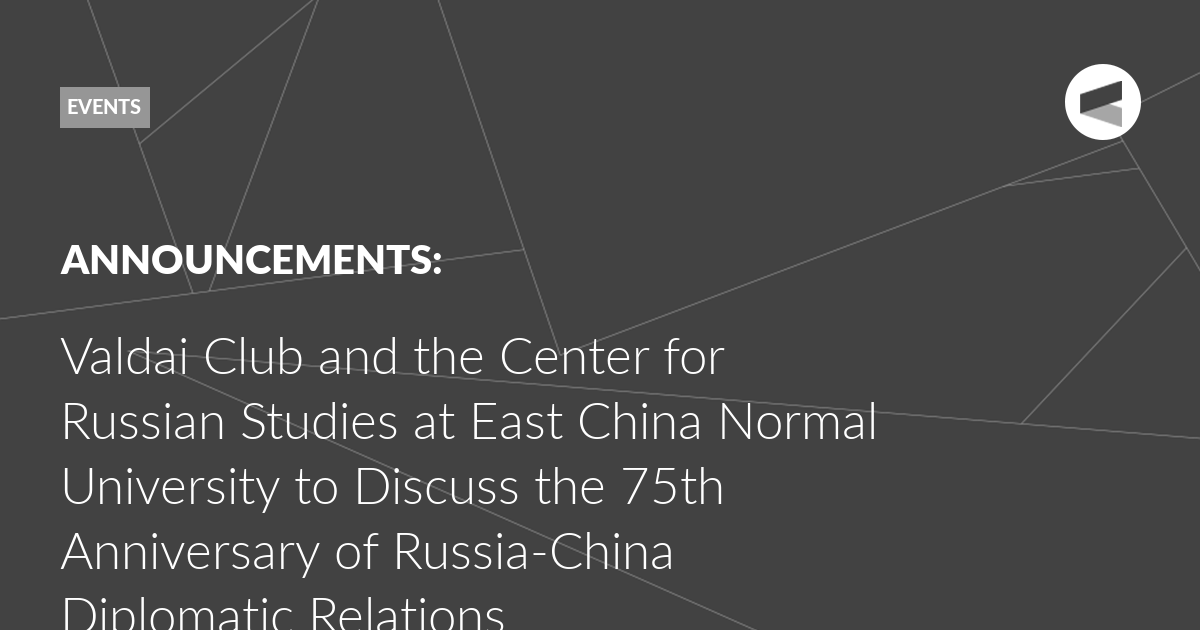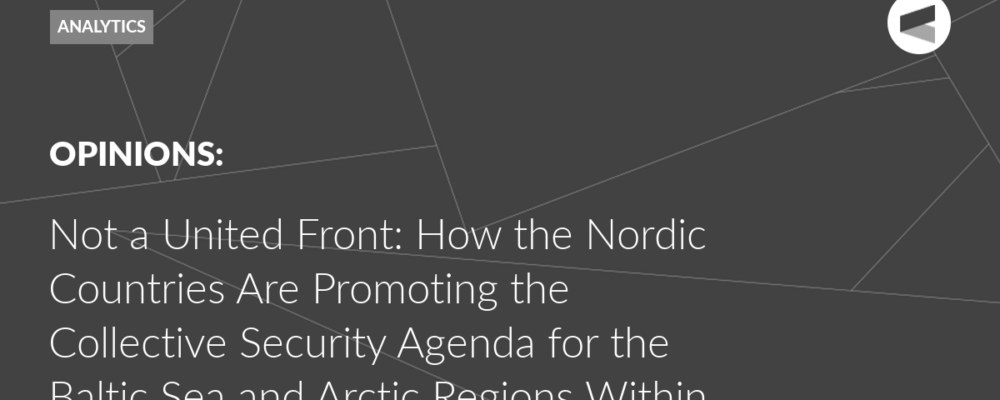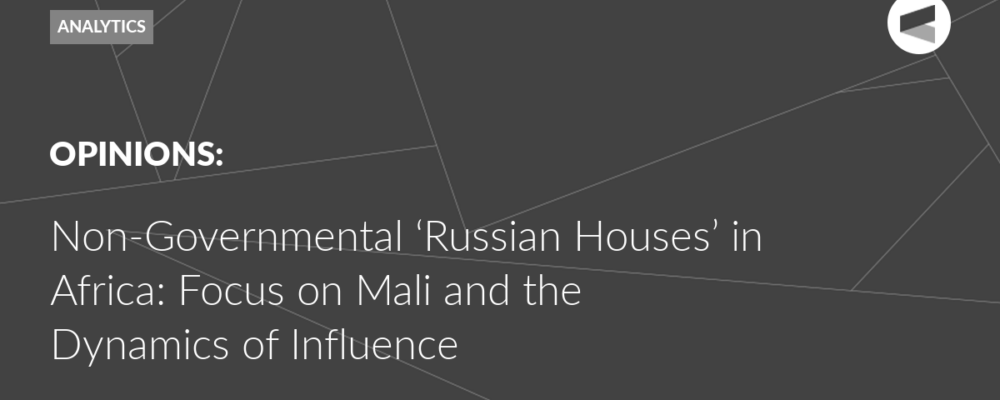On October 14–15, the Valdai Discussion Club and the Center for Russian Studies at East China Normal University will hold a Russian-Chinese conference in Moscow to mark the 75th anniversary of diplomatic relations.
The Center for Russian Studies at East China Normal University is one of the largest institutes in China studying Russia, the former Soviet Union, and Chinese-Russian relations. It also serves as a platform for other Chinese think tanks to collaborate with Russian expert circles.
The Valdai Club continues to maintain an active bilateral dialogue and consistently expands ties with the expert community in China. Among the regular participants of the Valdai Discussions are representatives of Tsinghua University, the Research Institute of the Xinhua News Agency, the Shanghai Center for Strategic and International Studies, and the Institute of International Studies of Fudan University.
The goal of the conference is to compare the assessments and approaches of Russia and China to international problems, to identify common and different positions, as well as ways to coordinate and integrate them in the context of the formation of a new world order.
Russian-Chinese relations have now reached the highest level of trust, comprehensive partnership, and strategic interaction. Both countries share common approaches to issues of global development and international security, and together advocate fair multilateralism, the primacy of international law, and the central role of the UN.
Russia and China are successfully increasing trade turnover and developing the necessary payment infrastructure. Currently, 95% of settlements between the two countries are carried out in national currencies. BRICS can play a key role in creating an alternative to the dollar-based financial system and giving it a multilateral character. The BRICS community of states most closely corresponds to the principles of equality, mutual respect and mutually beneficial cooperation inherent in the emerging world order.
Russia and China are also making their contribution to the construction of a new security architecture. The current military-political confrontation has shown that the security system in Europe can no longer exist separately from the security of the entire Greater Eurasia region. Russia is proposing the idea of a single Eurasian security system and is ready to mutually search for ways to integrate it with the Global Security Initiative put forward by China.
The two-day conference program includes opening and closing ceremonies, as well as four thematic sessions. The participants will be addressed with welcoming speeches by Andrey Bystritskiy, Chairman of the Board of the Foundation for Development and Support of the Valdai International Discussion Club, Feng Shaolei, Director of the Center for Russian Studies at East China Normal University, and Zhang Hanhui, Ambassador Extraordinary and Plenipotentiary of the People’s Republic of China to the Russian Federation.
During the sessions, the experts will discuss the following topics:
-
Global transformation of the world order and the strategic response of China and Russia;
-
Stability, development and security in Greater Eurasia;
-
China, Russia and the construction of a new type of multilateralism;
-
Cooperation in education, humanities and communications in the digital age.
In the Chinese tradition, the concept of a clash of civilizations is preferred to the idea of mutual learning and coexistence of different cultures. The dialogue between Russia and China can become an example for the countries of the world majority that seek to achieve their own development goals while preserving their sovereignty and national identity.
The Russian delegation at the conference in Moscow will be represented by: Anna Bessmertnaya, Chairperson of the Commission on Cooperation with Partners from China of the Moscow Chamber of Commerce and Industry; Sergey Goncharov, Leading Researcher of the China Department of the Institute of Oriental Studies of the Russian Academy of Sciences; Ekaterina Zaklyazminskaya, Senior Researcher of the Institute of China and Modern Asia of the Russian Academy of Sciences; Vasily Kashin, Director of the Center for Comprehensive European and International Studies at the National Research University Higher School of Economics; Andrey Kortunov, Academic Director of the Russian International Affairs Council; Aleksey Kupriyanov, Head of the Indian Ocean Region Center at IMEMO RAS; Aleksandr Lomanov, Deputy Director for Research at IMEMO RAS; Sergey Luzyanin, Professor of the Department of Foreign Regional Studies at HSE; Igor Makarov, Head of the Department of World Economy at the Faculty of World Economy and World Politics at HSE; Victoria Panova, Vice-Rector of HSE, Russian Sherpa at the Women’s Twenty (W20); Anastasia Pyatachkova, Deputy Head of the Asia-Pacific Sector at HSE Center for Comprehensive European and International Studies; Dmitry Stefanovich, Research Fellow at IMEMO RAS Center for International Security; Oleg Barabanov, Programme Director of the Valdai Discussion Club, Professor at MGIMO University; Andrey Sushentsov, Program Director of the Valdai Discussion Club, Dean of the Faculty of International Relations at MGIMO University; Ivan Timofeev, Programme Director of the Valdai Discussion Club, General Director of the Russian International Affairs Council; Fyodor Lukyanov, Research Director of the Valdai Discussion Club; Timofei Bordachev, Programme Director of the Valdai Discussion Club, Academic Director of the Center for Comprehensive European and International Studies at the National Research University Higher School of Economics and others.
The Chinese side will be represented by: Wang Xiaoquan, Director of the Research Department of the Institute for Russian, East European and Central Asian Studies, Chinese Academy of Social Sciences; Liu Jun, Executive Director of the Center for Russian Studies, East China Normal University; Sun Zhuangzhi, Director of the Institute of Russian, East European and Central Asian Studies, Chinese Academy of Social Sciences; Cui Hongjian, Director of the Center for EU and Regional Development Studies; Professor, Institute of Advanced Study of Regional and Global Governance, Beijing Foreign Studies University; Wu Dahui, Deputy Director of the Institute of Russian Studies, Tsinghua University; Zhang Xin, Deputy Director of the Center for Russian Studies, East China Normal University; Liu Junmei, Deputy Director of the Institute of Economics, Fudan University; Qu Weny, Director of the Institute of Russian and Eurasian Studies, East China Normal University; Wan Qingsong, Associate Professor, Center for Russian Studies, East China Normal University; Bei Wenli, Director of the Center for Belarus Studies, East China Normal University; Gong Nan, Associate Professor, School of Law, Heilongjiang University; Xu Guangmiao, Associate Professor of the Center for Russian Studies, East China Normal University and others.
Working languages: Chinese, Russian.
Information for the media!
Information for the media: In order to get accredited for the event, please fill out the form on our web site. If you have any questions about the event, please call +79269307763. Links to the live broadcast of the discussion will be posted on all online platforms of the Valdai Club: on the website, X (formerly Twitter), VK, Telegram and Dzen. Accreditation will close on October 11 at 14:00 Moscow time.
The Valdai Discussion Club was established in 2004. It is named after Lake Valdai, which is located close to Veliky Novgorod, where the Club’s first meeting took place.
Please visit the firm link to site






